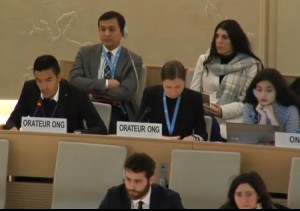 Edmund Rice International, together with Franciscans International, Destination Justice, and ChilOut organised a side event during the 31st session of the Human Rights Council (HRC) on the topic of Asylum Seekers Rights in Australia. Panellists included Phil Glendenning, President of the Refugee Council of Australia and Director of the Edmund Rice Centre in Sydney, Mohammad Ali Baqiri, Chilout Ambassador and a former child detainee on Nauru, and Claire Mahon from the Global Human Rights Group.
Edmund Rice International, together with Franciscans International, Destination Justice, and ChilOut organised a side event during the 31st session of the Human Rights Council (HRC) on the topic of Asylum Seekers Rights in Australia. Panellists included Phil Glendenning, President of the Refugee Council of Australia and Director of the Edmund Rice Centre in Sydney, Mohammad Ali Baqiri, Chilout Ambassador and a former child detainee on Nauru, and Claire Mahon from the Global Human Rights Group.
Phil Glendenning provided background and factual information on the current refugee and asylum seeker situation in Australia. Mohammad told a powerful story of his own personal experience of having to flee the Taliban in Afghanistan as a 10 year-old child, only to end up in a detention centre on the island of Nauru where he spent three years before managing to reach Australia. (Australia has since progressively tightened its policy to the point where all asylum seekers are intercepted at sea, sent to detention centres on Nauru and Manus Island and informed that they will never be allowed to settle in Australia).
Claire Mahon discussed the impacts detention centres have on women and children’s physical and mental health. Towards the end of the side event, Tanya Bennett, an Australian representative at the UN, spoke and briefly acknowledged Australia’s support of civil society organisations, while continuing to defend its immigration policy as supporting safe and legal pathways of immigration. Overall the event was very passionate and informative.
During the HRC session the report of the Universal Periodic Review (UPR) of Australia was adopted. Australia accepted 149 recommendations out of 290 made to it, and did not accept the vast majority of more than 60 recommendations made by UN member states in relation to refugees and asylum seekers.
Civil society representatives including ERI, delivered oral statements at the Council condemning the Australia’s policy. The ERI statement read by Mohammad Ali Baqiri can be viewed here. (scroll down the list of chapters on the right to No.19). A number of states also urged the removal of children from detention centres, with Australia responding that progress is being made in this regard with many children already being placed in “alternative places of detention within Australia”.
Further concerns raised included the impunity and the lack of accountability of corporations managing the centres who have been directly linked to human rights violations occurring in the centres. One of the more powerful statements was delivered by Gillian Triggs, the President of the Australian Human Rights Commission.
Overall it was clear that Australia has a long way to go to align its policies with international human rights standards and in the meantime civil society voices are getting louder and will continue to be heard until change is made.
– Kate Harold, ERI intern